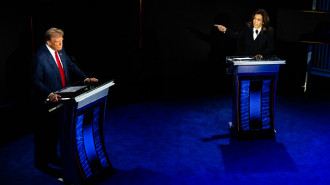Critics warn central bank intervention not enough to save Lebanese lira
The Central Bank of Lebanon (BDL) raised the price at which it sells US dollars on its Sayrafa exchange platform Wednesday night attempting to stabilise the plunging Lebanese lira.
The lira immediately gained some of its value, increasing from 91,000 Lebanese lira to the US dollar to 80,000 in less than a day.
BDL also increased the exchange rate at which public employees are paid their salaries, paying out salaries at 50 per cent of the actual exchange rate as opposed to 15 per cent.
Analysts, however, have said that the Central Bank's intervention is a short-term, "unsustainable" fix.
"It's not sustainable. After the effect of the Sayrafa [rate increase] ends, nothing has changed fundamentally, so the lira will continue its path towards depreciation," Raed Khoury, the former Lebanese Minister of Economy and Trade, told The New Arab.
Wednesday night's rate increase was not the first time that BDL intervened in the currency market to try to stop the depreciation of the lira.
In January 2022, BDL flooded the market with dollars to bring the lira rate down from 34,000 to 24,000.
The move temporarily arrested the nosedive of the currency, but only for a limited time and at great cost to the BDL's balance sheet.
BDL has said that its foreign reserves are below US$10 billion. Foreign reserves are used for key imports and theoretically can be used to pay back depositors whose accounts were frozen after the 2019 financial crisis.
"Either we keep them for the future and the benefit of the depositors … Or we use them to support a currency that is depreciating," Khoury said.
The International Monetary Fund (IMF) has outlined reforms the Lebanese government should take to access international funds and restore confidence in the country's economy.
However, the government has yet to adopt any of the recommended or any other significant economic reforms since 2019.
A dollarised economy
On Wednesday, Lebanese supermarkets began to price their goods in dollars in keeping with a new directive from the Ministry of Economy and Trade.
The policy is an acknowledgement of an economy increasingly untethered from the value of the lira.
The price of goods in the Lebanese lira has skyrocketed since the financial crisis, and the country was named "the worst hit in the world" by food inflation in 2022.
In a December 2021 study, up to more than 85 per cent of respondents said they did not have access to US dollars.
The recent policy change, if nothing else, could increase sticker shock on the shelves.
Khoury said the policy will increase transparency in pricing and allow for pricing benchmarks which could be used to crack down on price inflation by supermarkets.
"At least you now have a reference in the supermarkets to the original price of products. The Ministry of Economy will have a better benchmark to compare prices and better control price manipulation," Khoury said.
Lebanese Minister of Economy Amin Salem warned on Wednesday that certain supermarkets tried to "take advantage" of the dollarisation by raising their prices in lira just before the policy's implementation.

![Palestinians mourned the victims of an Israeli strike on Deir al-Balah [Getty]](/sites/default/files/styles/image_684x385/public/2024-11/GettyImages-2182362043.jpg?h=199d8c1f&itok=xSHZFbmc)


![The law could be enforced against teachers without prior notice [Getty]](/sites/default/files/styles/image_684x385/public/2178740715.jpeg?h=a5f2f23a&itok=hnqrCS4x)
 Follow the Middle East's top stories in English at The New Arab on Google News
Follow the Middle East's top stories in English at The New Arab on Google News

![Voters in Michigan [Getty]](/sites/default/files/styles/image_330x185/public/2182490468.jpeg?h=a5f2f23a&itok=XMi_sWGX)
